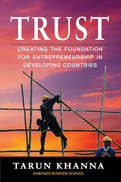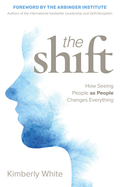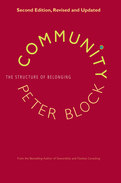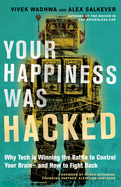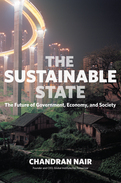Search Results: ""
Results 997-1002 of 1358
Trust
2018
Trust
Creating the Foundation for Entrepreneurship in Developing Countries
Entrepreneurial ventures often fail in the developing world because of the lack of something taken for granted in the developed world: trust. Over centuries the developed world has built up customs and institutions like enforceable contracts, an impartial legal system, credible regulatory bodies, even unofficial but respected sources of information like Yelp or Consumer Reports that have created a high level of what scholar and entrepreneur Tarun Khanna calls “ambient trust.” If a product is FDA-approved we feel confident it's safe. If someone makes an untrue claim or breaks an agreement we can sue. Police don't demand bribes to do their jobs. Certainly there are exceptions, but when brought to light they provoke a scandal, not a shrug.
This is not the case in the developing world. But rather than become casualties of mistrust, Khanna shows that smart entrepreneurs adopt the mindset that, like it or not, it's up to them to weave their own independent web of trust—with their employees, their partners, their clients, their customers and with society as a whole. This can certainly be challenging, and requires innovative approaches in places where the level of societal mistrust is so high that, as in one example Khanna provides, an official certification of quality simply arouses suspicion—and lowers sales! Using vivid examples from Brazil, China, India, Mexico and elsewhere, Khanna shows how entrepreneurs can build on existing customs and practices instead of trying to push against them. He highlights the role new technologies can play (but cautions that these are not panaceas), and explains how entrepreneurs can find dependable partners in national and local governments to create impact at scale.
As far back as the 18th century Adam Smith recognized trust as what Khanna calls “the hidden engine of economic progress.” “Frankness and openness conciliate confidence,” Smith wrote. “We trust the man who seems willing to trust us.” That kind of confidence is critical to entrepreneurial success, but in the developing world entrepreneurs have to establish it through their own efforts. As Khanna puts it, “the entrepreneur must not just create, she must create the conditions to create.”
Creating the Foundation for Entrepreneurship in Developing Countries
Entrepreneurial ventures often fail in the developing world because of the lack of something taken for granted in the developed world: trust. Over centuries the developed world has built up customs and institutions like enforceable contracts, an impartial legal system, credible regulatory bodies, even unofficial but respected sources of information like Yelp or Consumer Reports that have created a high level of what scholar and entrepreneur Tarun Khanna calls “ambient trust.” If a product is FDA-approved we feel confident it's safe. If someone makes an untrue claim or breaks an agreement we can sue. Police don't demand bribes to do their jobs. Certainly there are exceptions, but when brought to light they provoke a scandal, not a shrug.
This is not the case in the developing world. But rather than become casualties of mistrust, Khanna shows that smart entrepreneurs adopt the mindset that, like it or not, it's up to them to weave their own independent web of trust—with their employees, their partners, their clients, their customers and with society as a whole. This can certainly be challenging, and requires innovative approaches in places where the level of societal mistrust is so high that, as in one example Khanna provides, an official certification of quality simply arouses suspicion—and lowers sales! Using vivid examples from Brazil, China, India, Mexico and elsewhere, Khanna shows how entrepreneurs can build on existing customs and practices instead of trying to push against them. He highlights the role new technologies can play (but cautions that these are not panaceas), and explains how entrepreneurs can find dependable partners in national and local governments to create impact at scale.
As far back as the 18th century Adam Smith recognized trust as what Khanna calls “the hidden engine of economic progress.” “Frankness and openness conciliate confidence,” Smith wrote. “We trust the man who seems willing to trust us.” That kind of confidence is critical to entrepreneurial success, but in the developing world entrepreneurs have to establish it through their own efforts. As Khanna puts it, “the entrepreneur must not just create, she must create the conditions to create.”
The Shift
2018
A Simple yet Profound Shift
Seeing people as people is an idea so simple you'll swear you've heard it a million times but so profound you'll never stop learning from it. Kimberly White discovered it in a chain of nursing homes whose leaders, nurses, and housekeepers saw their patients, not as tasks to be ticked off a to-do list, but as valuable human beings.
White helps you to this transformative shift with warm encouragement, insightful guidance, and powerfully moving, true accounts of extraordinary human goodness.
Seeing people as people is an idea so simple you'll swear you've heard it a million times but so profound you'll never stop learning from it. Kimberly White discovered it in a chain of nursing homes whose leaders, nurses, and housekeepers saw their patients, not as tasks to be ticked off a to-do list, but as valuable human beings.
White helps you to this transformative shift with warm encouragement, insightful guidance, and powerfully moving, true accounts of extraordinary human goodness.
From beloved bestselling author Parker J. Palmer (Let Your Life Speak) comes a beautiful book of meditations and reflections on eight decades of life, the process of aging, his own spiritual journey (which has never been confined to a creed), and his vocation as a writer and thinker.From beloved bestselling author Parker J. Palmer (Let Your Life Speak) comes a beautiful book of meditations and reflections on eight decades of life, the process of aging, his own spiritual journey (which has never been confined to a creed), and his vocation as a writer and thinker.
On the Brink of Everything is an exploration of Parker Palmer's experience of living and aging, written in hopes of encouraging readers of every age to explore their life course. It is not a "guide to" or "handbook" for "getting old"--something all of us are doing all the time. Instead it's a set of meditations in prose and poetry that turn the prism on the meaning(s) of one's life--and on the importance of staying meaningfully engaged with life until the end. From beginning to end the book is packed with both humor and gravitas.
On the Brink of Everything is an exploration of Parker Palmer's experience of living and aging, written in hopes of encouraging readers of every age to explore their life course. It is not a "guide to" or "handbook" for "getting old"--something all of us are doing all the time. Instead it's a set of meditations in prose and poetry that turn the prism on the meaning(s) of one's life--and on the importance of staying meaningfully engaged with life until the end. From beginning to end the book is packed with both humor and gravitas.
Community
2018
As a response to the increasing violence in our culture, the widening ideological divides, and the growing gap in economic well-being, there is greater awareness that a deeper sense of community is desperately needed. But even as we acknowledge the need to build community, the dominant on-the-ground practices about how to engage people, civically and organizationally, remain essentially unchanged. We still believe community is built with better messaging, more persuasion, and social events for people to get to know each other better. All of which is naïve.
In this new edition, Block draws on a decade of putting these ideas into practice to emphasize what has worked and extract those thoughts that were nice but had no durability. He explores how technology, instead of bringing us together, has driven us into more isolation. New examples show that community building can be a more powerful way to address social problems than more traditional policies and programs. And encouragingly, Block insists this is really simple, once we decide it is essential. He offers a way of thinking that creates an opening for authentic communities to exist and details what each of us can do to make that happen.
In this new edition, Block draws on a decade of putting these ideas into practice to emphasize what has worked and extract those thoughts that were nice but had no durability. He explores how technology, instead of bringing us together, has driven us into more isolation. New examples show that community building can be a more powerful way to address social problems than more traditional policies and programs. And encouragingly, Block insists this is really simple, once we decide it is essential. He offers a way of thinking that creates an opening for authentic communities to exist and details what each of us can do to make that happen.
“Technology is a great servant but a terrible master. This is the most important book ever written about one of the most significant aspects of our lives—the consequences of our addiction to online technology and how we can liberate ourselves and our children from it.”
—Dean Ornish, M.D. Founder & President, Preventive Medicine Research Institute, Clinical Professor of Medicine, UCSF, Author, The Spectrum
Technology: your master, or your friend? Do you feel ruled by your smartphone and enslaved by your e-mail or social-network activities? Digital technology is making us miserable, say bestselling authors and former tech executives Vivek Wadhwa and Alex Salkever. We've become a tribe of tech addicts—and it's not entirely our fault.
Taking advantage of vulnerabilities in human brain function, tech companies entice us to overdose on technology interaction. This damages our lives, work, families, and friendships. Swipe-driven dating apps train us to evaluate people like products, diminishing our relationships. At work, we e-mail on average 77 times a day, ruining our concentration. At home, light from our screens is contributing to epidemic sleep deprivation.
But we can reclaim our lives without dismissing technology. The authors explain how to avoid getting hooked on tech and how to define and control the roles that tech is playing and could play in our lives. And they provide a guide to technological and personal tools for regaining control. This readable book turns personal observation into a handy action guide to adapting to our new reality of omnipresent technology.
—Dean Ornish, M.D. Founder & President, Preventive Medicine Research Institute, Clinical Professor of Medicine, UCSF, Author, The Spectrum
Technology: your master, or your friend? Do you feel ruled by your smartphone and enslaved by your e-mail or social-network activities? Digital technology is making us miserable, say bestselling authors and former tech executives Vivek Wadhwa and Alex Salkever. We've become a tribe of tech addicts—and it's not entirely our fault.
Taking advantage of vulnerabilities in human brain function, tech companies entice us to overdose on technology interaction. This damages our lives, work, families, and friendships. Swipe-driven dating apps train us to evaluate people like products, diminishing our relationships. At work, we e-mail on average 77 times a day, ruining our concentration. At home, light from our screens is contributing to epidemic sleep deprivation.
But we can reclaim our lives without dismissing technology. The authors explain how to avoid getting hooked on tech and how to define and control the roles that tech is playing and could play in our lives. And they provide a guide to technological and personal tools for regaining control. This readable book turns personal observation into a handy action guide to adapting to our new reality of omnipresent technology.
The free-market, limited government development model has been an ecological and social disaster for the developing world. Sustainable and equitable development is only possible with the active involvement of a strong central state that can guide the economy, protect the environment, and prioritize meeting their people's basic needs.
In this sure to be controversial book, Chandran Nair shows that the market-dominated model followed by the industrialized west is simply not scalable. The United States alone, with less than five percent of the world's population, consumes nearly a quarter of its resources. If countries in Asia, where 60% of the world's population lives, try to follow the Western lead, the results will be calamitous. .
Instead, Nair argues that development must be directed by a state that is willing and able to intervene in the economy . Corporations, which by design demand ever-expanding consumption, need to be directed towards meeting societal needs or otherwise restrained, not unleashed. Development has to be oriented towards the greatest good—clean drinking water for the many has to take precedence over swimming pools for the few. He provides three compelling case studies demonstrating the benefits of such strong state governance and the findings of weak state governance.
This will mean rethinking the meaning of concepts like “prosperity,” “freedom,” and “rights,” and whether democracy is always the best way to ensure responsive government—as Nair writes, “A democracy that cannot work to improve the life of its citizens is not better than a non-democracy that can actually improve quality of life.” Many people will find these to be challenging ideas, but what Nair offers is a model suited to the realities of the developing world, not the assumptions of the dominant culture.
In this sure to be controversial book, Chandran Nair shows that the market-dominated model followed by the industrialized west is simply not scalable. The United States alone, with less than five percent of the world's population, consumes nearly a quarter of its resources. If countries in Asia, where 60% of the world's population lives, try to follow the Western lead, the results will be calamitous. .
Instead, Nair argues that development must be directed by a state that is willing and able to intervene in the economy . Corporations, which by design demand ever-expanding consumption, need to be directed towards meeting societal needs or otherwise restrained, not unleashed. Development has to be oriented towards the greatest good—clean drinking water for the many has to take precedence over swimming pools for the few. He provides three compelling case studies demonstrating the benefits of such strong state governance and the findings of weak state governance.
This will mean rethinking the meaning of concepts like “prosperity,” “freedom,” and “rights,” and whether democracy is always the best way to ensure responsive government—as Nair writes, “A democracy that cannot work to improve the life of its citizens is not better than a non-democracy that can actually improve quality of life.” Many people will find these to be challenging ideas, but what Nair offers is a model suited to the realities of the developing world, not the assumptions of the dominant culture.


